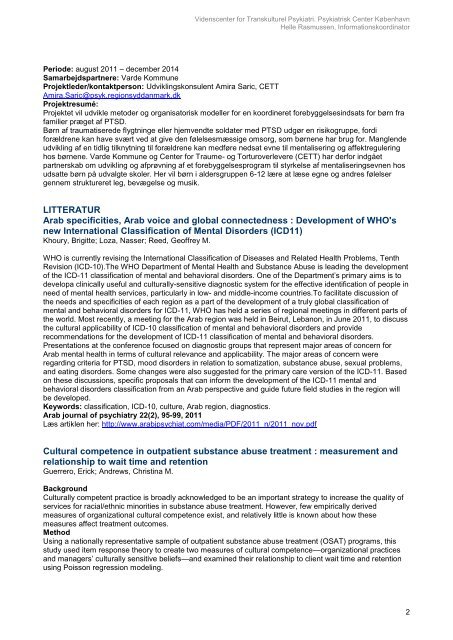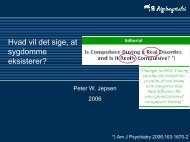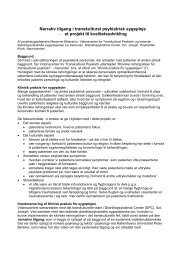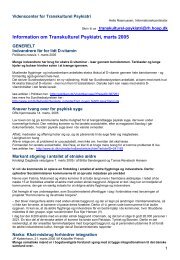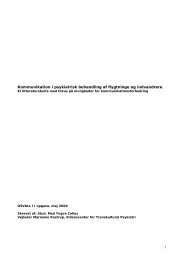Information om Transkulturel Psykiatri, marts 2009 - Videnscenter for ...
Information om Transkulturel Psykiatri, marts 2009 - Videnscenter for ...
Information om Transkulturel Psykiatri, marts 2009 - Videnscenter for ...
Create successful ePaper yourself
Turn your PDF publications into a flip-book with our unique Google optimized e-Paper software.
<strong>Videnscenter</strong> <strong>for</strong> <strong>Transkulturel</strong> <strong>Psykiatri</strong>. <strong>Psykiatri</strong>sk Center København<br />
Helle Rasmussen, <strong>In<strong>for</strong>mation</strong>skoordinator<br />
Periode: august 2011 – december 2014<br />
Samarbejdspartnere: Varde K<strong>om</strong>mune<br />
Projektleder/kontaktperson: Udviklingskonsulent Amira Saric, CETT<br />
Amira.Saric@psyk.regionsyddanmark.dk<br />
Projektresumé:<br />
Projektet vil udvikle metoder og organisatorisk modeller <strong>for</strong> en koordineret <strong>for</strong>ebyggelsesindsats <strong>for</strong> børn fra<br />
familier præget af PTSD.<br />
Børn af traumatiserede flygtninge eller hjemvendte soldater med PTSD udgør en risikogruppe, <strong>for</strong>di<br />
<strong>for</strong>ældrene kan have svært ved at give den følelsesmæssige <strong>om</strong>sorg, s<strong>om</strong> børnene har brug <strong>for</strong>. Manglende<br />
udvikling af en tidlig tilknytning til <strong>for</strong>ældrene kan medføre nedsat evne til mentalisering og affektregulering<br />
hos børnene. Varde K<strong>om</strong>mune og Center <strong>for</strong> Traume- og Torturoverlevere (CETT) har der<strong>for</strong> indgået<br />
partnerskab <strong>om</strong> udvikling og afprøvning af et <strong>for</strong>ebyggelsesprogram til styrkelse af mentaliseringsevnen hos<br />
udsatte børn på udvalgte skoler. Her vil børn i aldersgruppen 6-12 lære at læse egne og andres følelser<br />
gennem struktureret leg, bevægelse og musik.<br />
LITTERATUR<br />
Arab specificities, Arab voice and global connectedness : Development of WHO's<br />
new International Classification of Mental Disorders (ICD11)<br />
Khoury, Brigitte; Loza, Nasser; Reed, Geoffrey M.<br />
WHO is currently revising the International Classification of Diseases and Related Health Problems, Tenth<br />
Revision (ICD-10).The WHO Department of Mental Health and Substance Abuse is leading the development<br />
of the ICD-11 classification of mental and behavioral disorders. One of the Department‘s primary aims is to<br />
developa clinically useful and culturally-sensitive diagnostic system <strong>for</strong> the effective identification of people in<br />
need of mental health services, particularly in low- and middle-inc<strong>om</strong>e countries.To facilitate discussion of<br />
the needs and specificities of each region as a part of the development of a truly global classification of<br />
mental and behavioral disorders <strong>for</strong> ICD-11, WHO has held a series of regional meetings in different parts of<br />
the world. Most recently, a meeting <strong>for</strong> the Arab region was held in Beirut, Lebanon, in June 2011, to discuss<br />
the cultural applicability of ICD-10 classification of mental and behavioral disorders and provide<br />
rec<strong>om</strong>mendations <strong>for</strong> the development of ICD-11 classification of mental and behavioral disorders.<br />
Presentations at the conference focused on diagnostic groups that represent major areas of concern <strong>for</strong><br />
Arab mental health in terms of cultural relevance and applicability. The major areas of concern were<br />
regarding criteria <strong>for</strong> PTSD, mood disorders in relation to s<strong>om</strong>atization, substance abuse, sexual problems,<br />
and eating disorders. S<strong>om</strong>e changes were also suggested <strong>for</strong> the primary care version of the ICD-11. Based<br />
on these discussions, specific proposals that can in<strong>for</strong>m the development of the ICD-11 mental and<br />
behavioral disorders classification fr<strong>om</strong> an Arab perspective and guide future field studies in the region will<br />
be developed.<br />
Keywords: classification, ICD-10, culture, Arab region, diagnostics.<br />
Arab journal of psychiatry 22(2), 95-99, 2011<br />
Læs artiklen her: http://www.arabjpsychiat.c<strong>om</strong>/media/PDF/2011_n/2011_nov.pdf<br />
Cultural c<strong>om</strong>petence in outpatient substance abuse treatment : measurement and<br />
relationship to wait time and retention<br />
Guerrero, Erick; Andrews, Christina M.<br />
Background<br />
Culturally c<strong>om</strong>petent practice is broadly acknowledged to be an important strategy to increase the quality of<br />
services <strong>for</strong> racial/ethnic minorities in substance abuse treatment. However, few empirically derived<br />
measures of organizational cultural c<strong>om</strong>petence exist, and relatively little is known about how these<br />
measures affect treatment outc<strong>om</strong>es.<br />
Method<br />
Using a nationally representative sample of outpatient substance abuse treatment (OSAT) programs, this<br />
study used item response theory to create two measures of cultural c<strong>om</strong>petence—organizational practices<br />
and managers‘ culturally sensitive beliefs—and examined their relationship to client wait time and retention<br />
using Poisson regression modeling.<br />
2


